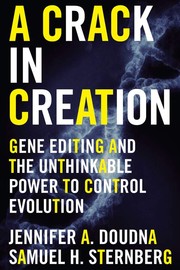Check nearby libraries
Buy this book

xx, 281 pages : 24 cm
Check nearby libraries
Buy this book

Previews available in: English
Subjects
Gene Editing, CRISPR, Genetic code, History, Genetic engineering, Genetics, Research, Rna, CRISPR-Cas Systems, Genetic Code, Genetic Research, MEDICAL, SCIENCE, Life Sciences, Genetics & Genomics, TECHNOLOGY & ENGINEERING, Biomedical, Genetic engineering -- History, Genetics -- Research -- History, Genetic research--history, Crispr-cas systems, Gene editing--history, Technology & engineering / biomedical, Science / life sciences / genetics & genomics, Medical / genetics, Genetic engineering--history, Genetics--research--history, Genetics--research, Qh442 .d6753 2017, Qh440 .d68 2017, Qu 11 aa1, 576.5072Showing 1 featured edition. View all 11 editions?
| Edition | Availability |
|---|---|
|
1
A Crack in Creation: Gene editing and the unthinkable power to control evolution
2017, Houghton Mifflin Harcourt, Mariner Books
Hardcover
in English
0544716949 9780544716940
|
aaaa
Libraries near you:
WorldCat
|
Book Details
Edition Notes
Includes bibliographical references and index.
Classifications
The Physical Object
ID Numbers
Source records
marc_openlibraries_sanfranciscopubliclibrary MARC recordBetter World Books record
Promise Item
marc_columbia MARC record
Promise Item
marc_nuls MARC record
amazon.com record
Internet Archive item record
ISBNdb
Work Description
A trailblazing biologist grapples with her role in the biggest scientific discovery of our era: a cheap, easy way of rewriting genetic code, with nearly limitless promise and peril.
Not since the atomic bomb has a technology so alarmed its inventors that they warned the world about its use. Not, that is, until the spring of 2015, when biologist Jennifer Doudna called for a worldwide moratorium on the use of the new gene-editing tool CRISPR—a revolutionary new technology that she helped create—to make heritable changes in human embryos. The cheapest, simplest, most effective way of manipulating DNA ever known, CRISPR may well give us the cure to HIV, genetic diseases, and some cancers, and will help address the world’s hunger crisis. Yet even the tiniest changes to DNA could have myriad, unforeseeable consequences—to say nothing of the ethical and societal repercussions of intentionally mutating embryos to create “better” humans.
Writing with fellow researcher Samuel Sternberg, Doudna shares the thrilling story of her discovery, and passionately argues that enormous responsibility comes with the ability to rewrite the code of life. With CRISPR, she shows, we have effectively taken control of evolution. What will we do with this unfathomable power?
Community Reviews (0)
Feedback?History
- Created August 15, 2017
- 14 revisions
Wikipedia citation
×CloseCopy and paste this code into your Wikipedia page. Need help?
| December 19, 2023 | Edited by ImportBot | import existing book |
| October 19, 2023 | Edited by Scott365Bot | import existing book |
| September 23, 2023 | Edited by Scott365Bot | Linking back to Internet Archive. |
| April 1, 2023 | Edited by ImportBot | import existing book |
| August 15, 2017 | Created by Ludovicus | Added new book. |









